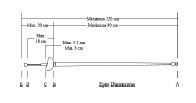I’ve started digging through a host of analytics data that shows me what questions people are asking when they come to Fencing.Net. With that in mind, I’ve started up this new section for frequently asked questions (FAQs).
Over the next several weeks (and maybe months), we’ll be going over the search data we have on what questions people are asking when they hit the site. For those we’ll either write up a new posting, or refresh an older post that already does a good job answering the question. If you have a fencing-related question that you’d like us to answer, then please shoot that via email to [email protected] and we’ll send you the answer as well as a link to the page if we publish your question.
Today’s question: How Long is a Fencing Sword?
Answer: The maximum length for a foil or epee is 110 centimeters (about 43.3 inches.) The maximum length for a fencing sabre is 105 centimeters (about 41.33 inches).
Longer answer (with background and references!):

In the sport of fencing there are standards for each weapon – foil, epee, and sabre – to make a level playing field for the athletes.
Since we are trying to hit the target with our fencing sword, a longer blade can give an advantage over an athlete with a shorter blade. Because of this, there are maximum lengths for both the blade and the overall foil, epee, and sabre.
The maximum blade length is the length of the blade measured from the bell guard to the tip of the weapon. There are different rules for each of the weapons, though foil and epee share the maximum lengths for the total fencing sword as well as the blade.
When reviewing the rules about the length, keep the following in mind:
The overall length takes into account the bell-guard and grip. The measurement is taken from the end of the tip to the end of the pommel or grip, whichever is longer.
- The blade is measured from the bell-guard to the tip.
- There are also maximum sizes for the bellguards, as those provide protection from hits as well.
- The overall lengths are set forth in the official international rules in metric lengths:
In foil and epee:
The maximum length of the blade is 90 cm
The maximum length of the foil or epee is 110cm

In sabre:
The maximum length of the sabre is 105cm
The maximum length of the sabre blade is 88cm
For additional rules about the size of the bell-guards, grips, as well as some illustrations you can use for guidance, please refer to Refer to m.3 of the rules. (FencingOfficials.org has download links to the current USA Fencing rulebook in various formats. Here is the link to the pdf format.)
OK. So what is a size 5 fencing blade?
Short answer: A size 5 blade is the standard, maximum length, fencing blade.
Fencing equipment suppliers designate shorter blades as size “2” or “0” to reference their shorter length. The only age group in USA Fencing that is not allowed to use a full sized fencing blade is the Y10 age group.
Longer answer:

Fencing blades used to be widely available in sizes from “0” to “5” with a size “5” blade being the maximum legal length. A “size 5” blade will be the maximum length allowed, 90cm for foil and epee, 88cm for sabre. This measures to approx 35.4 inches in foil and epee and 34.6 inches in sabre.
Today, the main lengths that are commercially available are the size “5” and size “2”. Some fencing clubs provide size “0” blades for their youth classes.
For USA Fencing Youth competitions, there is a shorter maximum blade size for Y10 (Under 10) age group events:
1. The maximum blade length permitted for Youth-10 competitions is 32.5
inches. (See Athlete’s Handbook, Section 2.6 and Materials Rules m.3). Parents
and fencers are advised that blades marketed as “#0” or “#2” blades are believed
to meet this requirement. Blades marketed as #0 or #2 blades that are longer
than 32.5 inches, though, are not permitted.
2. There are no special rules regarding the maximum blade length for Youth-12
and Youth-14 events. Blades must still comply with weapon-specific maximum
blade lengths (see Materials Rules m.3, m.8, m.16, m.23)
Typically, this means that for Y10 events you’ll have “Size 2” blades as those are the marketing designation for the blades that are allowed for fencing in the Y10 events. There is no overall governing body for marking blade sizes onto the blades, so keep in mind the guidance from the USA Fencing officials that it is the actual blade length, not the marked length, that applies.

